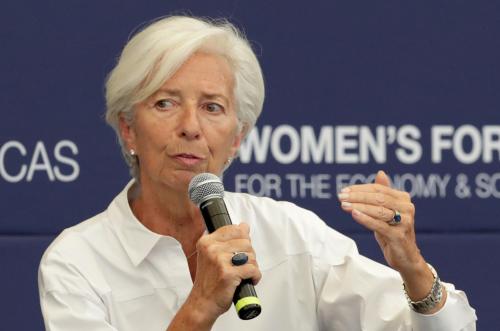In Sunday’s Greek elections, voters handed the reins of government over to the center-right New Democracy party, ushering Prime Minister Alexis Tsipras and his leftist Syriza party out of power. While New Democracy received only about 40% of the vote, it will have a slight majority in parliament, where the party with the most votes receives additional seats.
Syriza, which received about 32.5% of the vote, will be the largest opposition party in parliament. It will be joined by four other parties, which received between 3% and 8% of the vote: the center-left Movement for Change; the Communists; nationalist, pro-Russian Greek Solution; and leftist MeRa25. Notably, the far-right Golden Dawn party received only 2.93% of the vote, failing to reach the 3% threshold for parliamentary representation and garnering less than half of the 7% of votes it received in 2015, likely due to New Democracy co-opting the party’s anti-immigration messages.
In Loss, Syriza Cements Its Status
Syriza’s loss has long been expected. That Tsipras held his government together for nearly his entire four-year mandate defied frequent predictions of imminent government collapse. More surprising is that the party’s support dipped only slightly compared to 2015, from 35.5% to 31.5%. This result cements Syriza’s place as the dominant left-wing party in Greece, despite Tsipras’ imposition of harsh austerity measures during and after the Greek financial crisis and his negotiation of the unpopular Prespa Agreement to resolve the name issue with North Macedonia.
These results suggest both a movement toward the political centrism represented by New Democracy and a recognition that Syriza did not live up to its official name: the Coalition of the Radical Left. Instead, it governed pragmatically to lift Greece out of economic crisis and improve its standing on the international stage.
Thanks to austerity measures and other reforms enacted by Tsipras’ government, Greece has exited its bailout program, unemployment is down significantly, and the country is projected to be among the fastest growing in the eurozone (though its economy is still 24% smaller than before the crisis). U.S.-Greece relations are the strongest they have been in decades—an unexpected development given the Greek left’s traditional hostility toward the United States—and the resolution of the decades-long conflict with North Macedonia over its name earned Tsipras a reputation as a statesman.
Mitsotakis’s Agenda
Despite their political differences, the agenda of new Prime Minister Kyriakos Mitsotakis, the son of former Prime Minister Konstantinos Mitsotakis, will largely build on Tsipras’ achievements.
His cabinet, announced July 9, reflects his desire to govern from the center and includes a number of technocrats and some center-left members. Mitsotakis has promised a program of tax cuts, privatization, and measures designed to increase wages and employment while boosting Greece’s attractiveness to foreign investors. The measures may be well timed, as double-digit tourism growth has drawn the interest of multinational hospitality brands and private equity firms that increasingly view Greek assets as good values. However, Mitsotakis will need to tread carefully, particularly on tax cuts, to stay on the right side of Greece’s creditors.
What’s Next for Greek Foreign Policy
New Democracy has long been strongly pro-U.S. Mitsotakis, who has degrees from Harvard and Stanford, will no doubt continue that tradition. Despite identifying personally as a progressive, Mitsotakis is likely to play up his party’s ideological kinship with the Republican party on social issues, immigration, and tax cuts. He will also seek the Trump administration’s support for U.S. investment, deeper bilateral security cooperation, and help with what Greece views as Turkish provocations in the Eastern Mediterranean, such as the ongoing illegal drilling off the coast of Cyprus.
The Prespa Agreement, which ended a decades-long feud between Greece and North Macedonia over the latter’s name, created an opportunity for Greece to reengage with the Western Balkans and potentially reap economic benefits through additional trade with and transit of goods to the region. New Democracy strongly opposed the deal, in line with the views of its nationalist supporters in northern Greece, creating a potential friction point with the United States and some European leaders. While Mitsotakis has committed to abide by the agreement, he has also suggested he would veto North Macedonia’s eventual EU accession if Greek interests are not guaranteed. This will play into a wider discussion of the future of European integration, as French President Emmanuel Macron seeks a rethink of EU expansion plans that is likely to significantly delay aspirant countries’ prospects for membership, including North Macedonia and other Western Balkan countries.
Mitsotakis will also face questions from both sides of the Atlantic on Greece’s relationship with China. Greece was the first European country to join the Belt and Road Initiative, and the takeover of the port of Pireaus by a Chinese state-owned company set off Europe-wide discussions on Chinese strategic infrastructure investments. While Greece’s continuing recovery from the economic crisis makes it difficult for the country to turn down investments from any source, Mitsotakis will have to walk an increasingly thin tightrope between the United States and China as concerns about telecommunications giant Huawei and other issues sharpen divisions between the two powers.
Balancing Act Ahead
With the worst of Greece’s economic crisis behind it, and Greece’s relations with the United States and Europe on a high thanks to the Prespa Agreement, Mitsotakis has an opportunity to grow Greece’s economy and its stature on the international stage. Succeeding will require balancing competing demands—from his base, Greece’s creditors, U.S. and European allies, and competitors like China. Time will tell if he’s up to the task.
The Brookings Institution is committed to quality, independence, and impact.
We are supported by a diverse array of funders. In line with our values and policies, each Brookings publication represents the sole views of its author(s).








Commentary
The center right ousts leftists in Greece
Who won, who lost, and what’s next
July 9, 2019